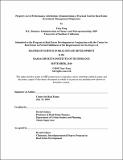Property-level performance attribution : demonstrating a practical tool for real estate investment management diagnostics
Author(s)
Feng, Tony
DownloadFull printable version (1.355Mb)
Alternative title
PPA : demonstrating a practical tool for real estate investment management diagnostics
Other Contributors
Massachusetts Institute of Technology. Center for Real Estate. Program in Real Estate Development.
Advisor
David Geltner.
Terms of use
Metadata
Show full item recordAbstract
Real estate investment firms have the ever increasing need for understanding their firm's strengths and weaknesses, their performance relative to their peers and competitors, and for developing assessment tools for facilitating more informed investment and management decisions. One potentially very useful tool to further these objectives, a tool that is so far underutilized and underappreciated, is investment performance attribution analysis. Such performance attribution may be broadly characterized as the partitioning of the total investment return of a particular manager or portfolio in order to quantify and help to understand and assess the components and determinants of the overall investment performance. Traditional investment attribution analysis, adopted from the securities investment industry, has focused primarily on the portfolio level, where property selection and allocation factors are the two primary attributes of total return that can be parsed and benchmarked. In the case of real estate investments, property-level investment functions such as operational management and asset transaction execution, which are not captured by a traditional attribution analysis, also play a major role in the overall investment returns. During the past two decades a system to drill the investment performance attribution down to a deeper level, separating the asset "selection" component into further breakouts, including income return and components of the capital return (cash flow change and yield change), have been propounded by influential firms such as the Investment Property Databank (IPD) based in the UK. In a 2003 article David Geltner proposed a system for property-level performance attribution (PPA) based on the since-inception IRR of each individual property investment. This thesis furthered Geltner's work on PPA by an in depth exploration of the application of the IRR-Based Property-Level Performance Attribution analysis based on a large-scale, real-world-based case study of a complete set of actual core-asset round-trip transactions completed by several internally managed funds in the institutional investment industry. Furthermore, this thesis explored the use of PPA for organizational management diagnostics, and thereby demonstrated the potential of using the PPA analysis as an investigative tool for developing plausible hypotheses about a firm's investment management strengths and weaknesses.
Description
Thesis (S.M. in Real Estate Development)--Massachusetts Institute of Technology, Program in Real Estate Development in Conjunction with the Center for Real Estate , 2010. Cataloged from PDF version of thesis. Includes bibliographical references (p. 141-142).
Date issued
2010Department
Massachusetts Institute of Technology. Center for Real Estate. Program in Real Estate Development.; Massachusetts Institute of Technology. Center for Real EstatePublisher
Massachusetts Institute of Technology
Keywords
Center for Real Estate. Program in Real Estate Development.